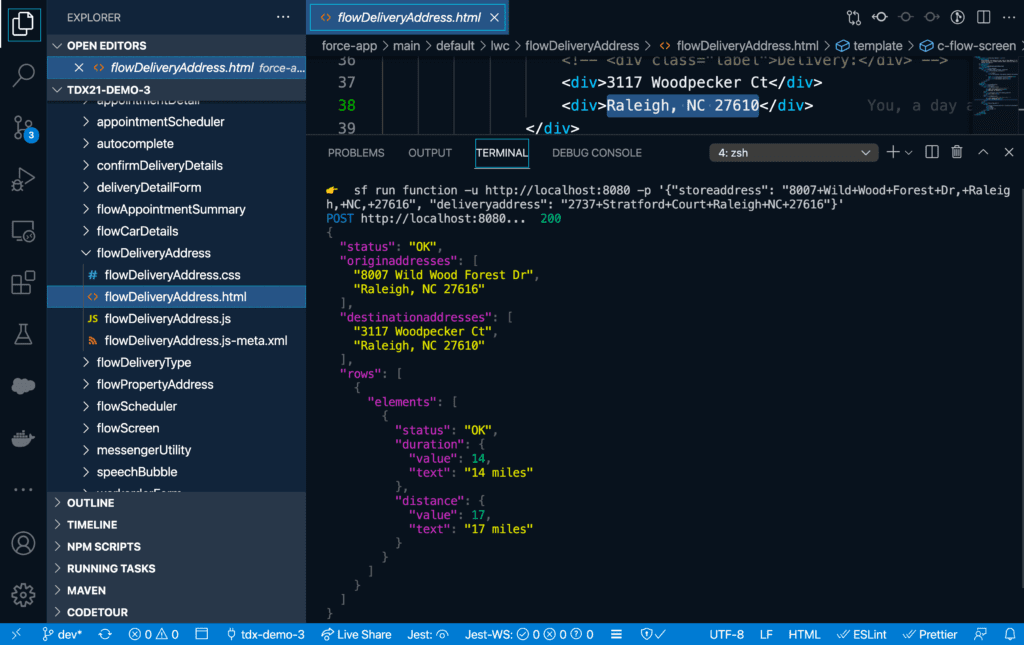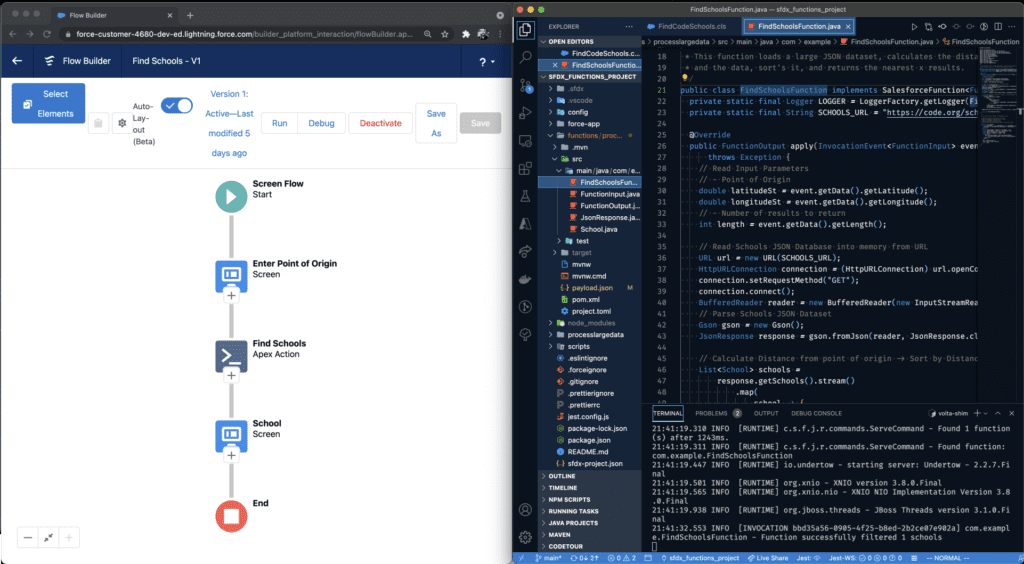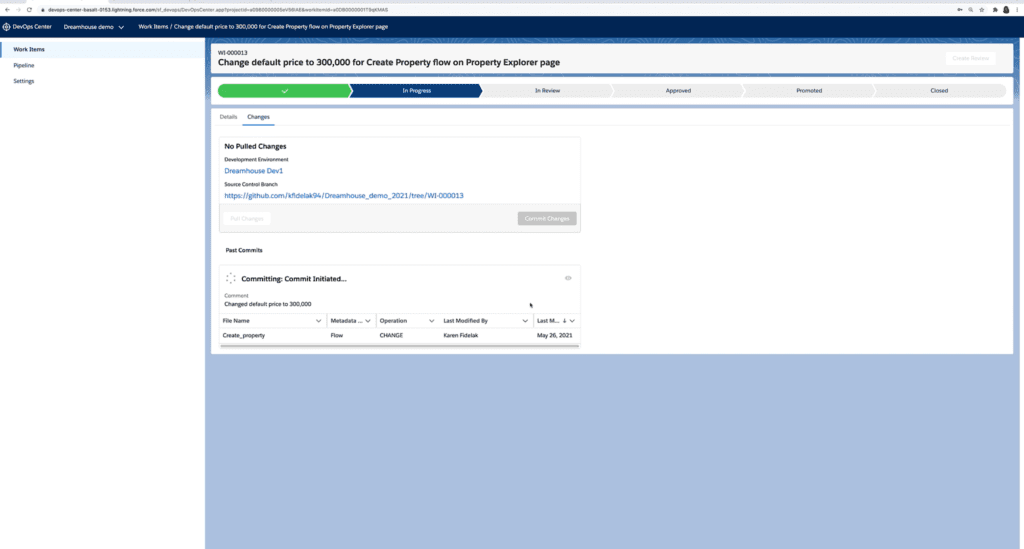TrailheaDX Showcases New Salesforce App Production Advances for 2021
Salesforce, the enterprise app platform vendor based in San Francisco, hosted today a global web conference called TrailheaDX that offered new app production tools and strategies for developers, administrators, architects, partners, and IT leaders. Announcements included details on upcoming app products, including DevOps Center, Salesforce Functions, and the unified CLI. The company steered attention to advances in its low-code development tools, which it says is in high demand among customers to meet the demands of digital transformation projects. “The trusted, powerful Salesforce Platform makes it easier and faster for everyone to build apps and get back to growth,” said Patrick Stokes, Executive Vice President and General Manager of Platform, Salesforce in a press release.
Unified CLI Announced

As part of TrailheaDX the company announced the new “sf” command line interface (SF-CLI) as part of a unification strategy. According to a blog posting published today, the new CLI is designed to facilitate cross and multi-cloud development. For example, the new “sf project deploy” command deploys a project directory no matter if it has Heroku, Tableau, MuleSoft or regular Force.com components.
The relationship between the SF-CLI with SFDX-CLI is not super clear at this point. But the company said in the blog posting those existing scripts using SFDX-CLI should not be in danger because both the SF-CLI and SFDX-CLI are always installed. After checking out the commands available in a demo version of SF-CLI, it seems like users will be able to replace most of their SFDX-CLI commands with SF-CLI equivalents. The posting also stated that command parameters and flags used in SFDX-CLI should be able to be used in SF-CLI equivalents.
The posting also mentioned that SFDX-CLI plugins should port easily to SF-CLI due to the use of the OCLIF framework in both systems.
Salesforce Functions Almost Ready

The company showed off progress in Salesforce Functions, where customers may write code in Java or JavaScript for NodeJS, and then have that code run separately from Salesforce but in a secure context that gives the Function access to Salesforce data, according to a blog posting. The new SF-CLI is used to manage the use of Salesforce Functions.
General Availability for the product was announced to be part of the Winter ’22 release. The product is currently in beta and is currently only available for testing in sandbox or scratch orgs. Production access will not be permitted until the project moves past the current beta edition.
During a Q&A session, the company acknowledged that they do not provide any additional security for Salesforce Functions to prevent it from being built with malicious code embedded in a public library. The company touted the ability to build an application with public libraries as a major feature but acknowledged that a developer may inadvertently incorporate malware as a side effect, and that developers must be responsible for checking those components. The company also pointed out that built-in Salesforce security mechanisms should keep any untoward activity to a minimum.
DevOps Center Chugging Along

Much audience questions and interest at TrailheadDX focused on the Salesforce DevOps Center, but the company had little news or updates from the information put out in late 2020. A few major questions about DevOps Center were clarified, however.
Salesforce is about to start enrollment for the official beta program, which has not yet begun but is expected for later in 2021. Based on current timetables, a generally available release should be available by Spring 2022. Pricing is not set, but the company did state that a generous free tier of DevOps center will be available to all orgs. A paid edition will also be available, but the company has not made any distinctions between the paid and no-charge versions at this time.
No specific plans for integrations were announced, but the company indicated that DevOps center will integrate with Jira for issue tracking. Also, the company said that GitHub is the only repository management system currently supported, but they do plan to add Bitbucket and Gitlab repositories soon. Private code repositories are being considered, but present special challenges for platform access.
Source tracking in Sandboxes, a feature used by Salesforce DevOps Center to manage deployments, was also shown during the conference. This enables developers to track code changes in a Sandbox environment the same way source code changes are handled in scratch orgs.
Additional Low-Code App Production Features
In addition to a mainly developer-centric program, the company also introduced some more admin-friendly features at TrailheaDX.
Dynamic Interactions is a new feature where writers of Salesforce Lightning Web Components may create interfaces that may be arbitrarily “wired” together via the Lightning App Builder. This enables components to receive updates and automatically transmit data updates to related components.
Other low-code tools shown include Flow Orchestrator for developing Salesforce workflows and MuleSoft Composer for designing multi-system interactions.
Changes are Still Happening
The event concluded with a session called “True to the Core: Meet the Executives,” where about a dozen key executives took questions from the user community. Issues covered included the recent outages, plus what the company intended to do with the OmniStudio, the user experience tool which was recently added to the Salesforce developer stack via the Vlocity acquisition.
These questions and comments by company executives brought out a curious possibility. It looks like Salesforce is looking to incorporate OmniStudio and its own unique devops process into the overall app production pipeline for Salesforce apps. So, with the delay of Salesforce DevOps Center and these winds of change around OmniStudio, it looks like the Salesforce devops tooling and lifecycle management efforts are still a work in progress.






